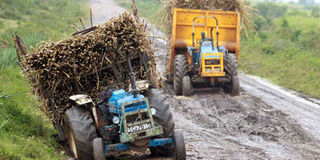Sugarcane farmers in western Kenya have hardly helped their cause

Tractors carrying sugarcane struggle to pass through bad roads on their way from farms to Muhoroni Sugar Company on September 12, 2016. PHOTO | TONNY OMONDI | NATION MEDIA GROUP
What you need to know:
It is all too easy to launch into lamentations about government neglect.
But a lot of times it takes citizen action to prompt the government to discharge its duties.
To their credit the coffee farmers in central Kenya were alive to this reality and seized the moment to get their voice heard through their cooperatives and political leadership.
It is every investigative journalist’s dream that his or her work ends up triggering a robust public conversation around the issues raised and some positive action by the people in authority.
I believe that is all that John Kamau and his team at the Nation’s investigations desk have wished for with their recent reports exposing the rot in the country’s coffee and sugar farming.
The public response to the coffee report was probably more than Kamau had wished for, and I won’t be surprised if he retreated to his local pub one evening to drink to investigative journalism. Readers occupied the newspaper’s Letters to the Editor and Opinion pages for weeks expressing shock at the depth of the rot in one of the country’s key economic sectors.
Farmers in the major coffee-growing areas of central Kenya called local radio stations appealing to the government to come to their rescue.
A delegation of local leaders paid President Uhuru Kenyatta a visit at State House to lobby for action. A task force was soon put together to provide a road map for the recovery of the coffee sector. Recent media reports have suggested that a coffee boom is brewing once again.
What are the odds that the Nation’s latest investigations on sugar will also have a happy ending? Zero, if you ask me.
UNWRITTEN POLICY
The official indifference already being displayed is consistent with the Jubilee administration’s unwritten policy of rationing development to areas perceived to be Opposition strongholds. A sugar task force may never be formed, and reports of a sugar boom in western Kenya may never come.
Enough of my grievance mongering. It’s all too easy to launch into lamentations about government neglect.
But a lot of times it takes citizen action to prompt the government to discharge its duties. To their credit the coffee farmers in central Kenya were alive to this reality and seized the moment to get their voice heard through their cooperatives and political leadership.
In contrast their sugarcane-growing counterparts in western Kenya have hardly helped their cause by choosing to remain relatively passive. If they feel angry about the activities of the sugar cartels that made sugarcane growing unprofitable, the corporate fraudsters who ran down their factories and the thieves who stole their land, they are yet to show it publicly.
The next time a delegation of MPs from Kakamega and Bungoma calls on the President at State House, chances are they’ll be negotiating the price of defecting to Jubilee Party and not discussing a bailout package for Mumias and Nzoia sugar mills.
As for their Luo Nyanza counterparts, nothing enhances one’s chances of being elected like mastering the art of dramatising loyalty to Baba.
Otieno Otieno is the chief subeditor of the ‘Business Daily’.





